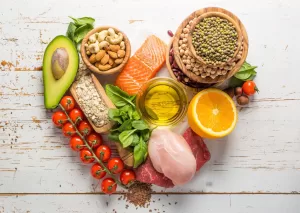Diet and Colorectal Cancer: Foods That May Reduce Your Risk
When it comes to your health, the foods you eat play a crucial role. This is especially true for colorectal cancer, one of the most common and preventable forms of cancer. By making informed dietary choices, you can potentially reduce your risk of developing this disease. While no single food can guarantee protection, research has identified several nutritional powerhouses that may help safeguard your colon health. In this article, we’ll explore the connection between diet and colorectal cancer, and highlight specific foods that show promise in lowering your risk. Armed with this knowledge, you can take proactive steps to support your digestive health through smart eating habits.
Colorectal Cancer Prevention
Adopting a healthy lifestyle is crucial for colorectal cancer prevention. A plant-based, high-fiber diet rich in fruits, vegetables, and whole grains can significantly reduce your risk. Incorporate a variety of colorful produce to benefit from different micronutrients and antioxidants. For instance, green leafy vegetables provide lutein and beta-carotene, while red fruits offer lycopene. Limit red and processed meats, as they may increase cancer risk. Maintain a healthy weight through regular physical activity and moderate alcohol consumption. Remember, nutrition for cancer patients is equally important, so consult a registered dietitian for personalized advice. By incorporating these healthy eating habits in Singapore and elsewhere, you can take proactive steps towards reducing colon cancer risk factors.
Colorectal Cancer Risk Factors
Understanding the risk factors for colorectal cancer is crucial for effective prevention and early detection. Studies have identified several key factors that may increase your risk, including age, family history, and certain lifestyle choices. Being overweight or obese, maintaining a sedentary lifestyle, and poor dietary habits are significant contributors to colon cancer risk factors. A diet high in red and processed meats has been associated with a 10-22% increased risk, while regular alcohol consumption and smoking also elevate the risk. However, adopting a healthy eating Singapore lifestyle can make a difference. Focusing on nutrition for cancer patients and those at risk, incorporating a plant-based, high-fiber diet rich in whole grains, fruits, and vegetables may reduce colorectal cancer risk by 12-17%. Regular colorectal cancer prevention screenings are also essential, especially for individuals over 45.
Foods That May Reduce Colorectal Cancer Risk
A Colorful Plate for Cancer Prevention
A diet rich in fruits and vegetables is key for colorectal cancer prevention. Embrace a rainbow of produce to maximize your intake of cancer-fighting nutrients. Green leafy vegetables like kale and spinach offer lutein and beta-carotene, while orange fruits and veggies provide natural beta-carotene. Red options like tomatoes are packed with lycopene. This variety ensures a robust mix of antioxidants and minerals that support a healthy eating Singapore lifestyle.
Protein and Fiber for Protection
Incorporating fatty fish like salmon, rich in omega-3 fatty acids, may slow cancer cell growth. Beans and legumes offer a powerful combo of fiber, protein, and antioxidants. Whole grains provide essential nutrients and fiber, potentially helping to eliminate cancer-causing compounds. These foods form a crucial part of a cancer diet aimed at reducing colon cancer risk factors.
Lifestyle Changes That May Reduce Colorectal Cancer Risk
Diet and Physical Activity
A healthy diet plays a crucial role in colorectal cancer prevention. According to the CDC, consuming a diet low in animal fats and rich in fruits, vegetables, and whole grains may help reduce your risk. Embracing healthy eating habits in Singapore can significantly impact your overall well-being. Regular physical activity is equally important, as studies suggest that increasing exercise may help lower colon cancer risk factors.
Weight Management and Substance Use
Maintaining a healthy weight is essential for reducing your risk of colorectal cancer. The Mayo Clinic Health System recommends limiting alcohol consumption and quitting smoking to further decrease your risk. These lifestyle modifications, combined with proper nutrition for cancer patients, can significantly contribute to overall cancer prevention efforts.
Colorectal Cancer Screening
Importance of Regular Screening
Colorectal cancer prevention starts with regular screening. The U.S. Preventive Services Task Force recommends that adults aged 45 to 75 should undergo colorectal cancer screening, which is crucial for early detection and improved outcomes. There are several screening options available, including stool-based tests and visual exams of the colon and rectum.
Screening Options
The American Cancer Society suggests various screening methods:
- Stool-based tests (annually or every 3 years)
- Colonoscopy (every 10 years)
- CT colonography (every 5 years)
These tests play a vital role in a comprehensive cancer diet and nutrition for cancer patients strategy. For those in Singapore, maintaining a healthy eating Singapore lifestyle alongside regular screening can significantly reduce colon cancer risk factors.
Conclusion
In conclusion, your dietary choices play a crucial role in reducing colorectal cancer risk. By incorporating fiber-rich fruits, vegetables, and whole grains into your meals, you can promote digestive health and potentially lower your cancer risk. Limiting processed meats and embracing lean proteins, along with increasing your intake of foods rich in antioxidants and omega-3 fatty acids, may further bolster your defenses. Remember, no single food is a magic bullet against cancer. Instead, focus on cultivating a balanced, nutrient-dense diet as part of a holistic approach to health. By making informed decisions about what you eat, you take an active step in safeguarding your colorectal health and overall well-being.
Disclaimer: The content for this article is for informational purposes only and is not a substitute for professional medical advice, diagnosis, or treatment. Always consult your oncologist with any questions regarding a medical condition. Do not disregard medical advice or delay seeking it based on information from this site.

